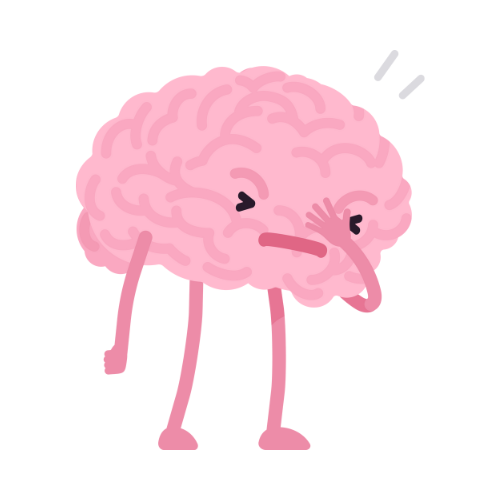Why ADHD Makes Now So Tempting: A Guide to Temporal Discounting
What is Temporal Discounting?
Temporal discounting is when you prioritize immediate, smaller rewards over tasks with long-term benefits. ADHD brains have a preference for this, which can lead to challenges in getting tasks done at work, managing finances, and maintaining self-care.
But remember, this isn't your fault—it’s just how your brain is wired. Living in a neurotypical world that isn’t designed for you can be tough. This blog will discuss strategies for adhd women to manage temporal discounting, helping to reduce stress and prevent burnout.

Why ADHD Brains Are Prone to Temporal Discounting
As and ADHD women, your brain is wired to seek immediate rewards due to lower levels of dopamine—the neurotransmitter that influences motivation and reward. This isn’t a deficiency; it’s simply a different way your brain operates. In the right circumstances, your brain thrives.
However, in today’s world, where long-term planning is often necessary, this can lead to stress and burnout.
Expanded Explanation of Dopamine’s Role:
Lower dopamine levels in the ADHD brain mean that immediate rewards provide a quicker, stronger hit of satisfaction. The brain is constantly seeking ways to boost dopamine levels, which makes smaller, more immediate rewards feel more appealing. Understanding this can help you see why those quick wins, like checking off small tasks, are so tempting.
How Temporal Discounting Impacts Different Areas of Life
Temporal discounting shows up in various aspects of life. Here are some common patterns that ADHD women often struggle with:
- Work: ADHD women often focus on smaller tasks and struggle with larger projects that require sustained effort and planning. This can lead to last-minute stress when deadlines loom.
- Example: Instead of working on a report due next week, you might spend time on tasks that provide immediate rewards. These tasks feel more manageable and give you an immediate sense of accomplishment.
- Finances: ADHD women might spend money on immediate treats rather than saving for long-term goals.
- Example: Buying lunch daily feels satisfying but adds up over time, making it harder to save for bigger financial goals, like a vacation or retirement.
- Self-Care: It’s easy to focus on everything but self-care activities, but neglecting yourself leads to physical and emotional burnout.
- Example: You might go all day without drinking water, contributing to dehydration and fatigue.
How Temporal Discounting Contributes to Burnout
Constantly putting off activities that don't have immediate rewards can lead to stress. Unaddressed issues mount up at work and home, making everything feel harder to handle. Over time, when sleep, exercise, and proper nutrition are consistently delayed, this can lead to burnout. Temporal discounting contributes to neurodivergent burnout in ADHD individuals.
Understanding this connection empowers you to make small changes that can prevent burnout.
What is Nudging and How Can It Help?
Nudging is a behavioral economics technique that involves creating small, intentional reminders or environmental changes that guide you toward better long-term decisions without imposing strict rules. Nudging doesn’t force you into anything; instead, choosing what’s best for your long-term well-being is easier.
How The Nudging Strategy Can Support Self-Care and Prevent Burnout
- Personalized Reminders: Set up reminders on your phone or calendar for self-care activities. These may help you counteract the urge to focus only on immediate tasks.
- Visual Cues: Use sticky notes or visual reminders in your environment to encourage healthy habits, like drinking water, taking breaks, or going to bed on time. These cues are simple yet effective ways to nudge yourself toward self-care.
- Habit-Tracking Apps: Apps that track your habits can serve as positive reinforcement. They help you see your progress and stay motivated. Celebrating small wins can make long-term goals feel more attainable.
Nudging helps create an environment that supports your natural tendencies while guiding you toward choices that benefit your long-term health and happiness.
What Do Loved Ones Need to Know About Temporal Discounting?
Loved ones should understand that temporal discounting is a natural aspect of how ADHD brains function. It’s not about laziness or a lack of discipline; it’s about how the brain prioritizes tasks differently.
What Loved Ones Can Do:
- Offer Understanding, Not Criticism: Recognize that temporal discounting is a common challenge for people with ADHD. Avoid offering unsolicited advice or interventions; instead, focus on understanding why certain tasks might feel overwhelming.
- Respect Autonomy: Offer help when asked, but allow your loved one to take the lead in managing their tasks and decisions. Respecting autonomy is crucial in empowering your loved one to find their strategies and solutions.
- Provide Encouragement: Celebrate successes, no matter how small. Positive reinforcement for their chosen goals can be a powerful motivator. This helps build confidence in managing both immediate and long-term goals.
Being understanding, patient, and encouraging is helpful. Remember, your role is to offer support only when it’s requested and to affirm their efforts and progress.
Empower Yourself: Simple Steps to Start Today
- Identify Where Temporal Discounting Interferes: Think about what’s important to you. How might temporal discounting be interfering?
- Set Small Goals: Set a small goal related to what’s important to you.
- Use Reminders as Nudges: Use small reminders to start working on that goal, using any kind of app.
- Use Post-Its as Nudges: Use Post-Its about that goal and place them around the house.
- Use Positive Reinforcement: Reward yourself for completing tasks that contribute to your long-term goals.
- Seek Understanding and Support: Let loved ones know how they can support you.
Conclusion
Temporal discounting is a natural tendency of the ADHD brain. In a neurotypical world, it can present challenges. However, you can overcome some of these challenges by using nudges, such as reminders and Post-Its. This can help you reduce stress and create a healthier balance between the time crunch of immediate and long tasks and long-term well-being.
Remember, your brain is unique and powerful, not defective. You can thrive in a way that works best for you.







